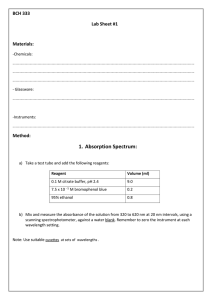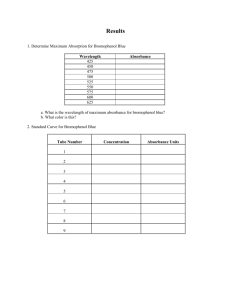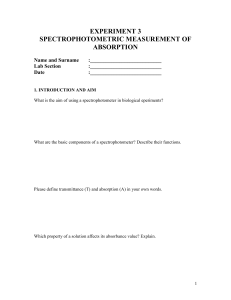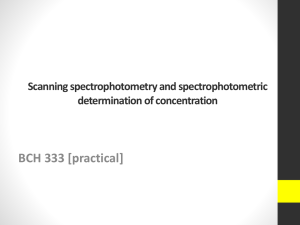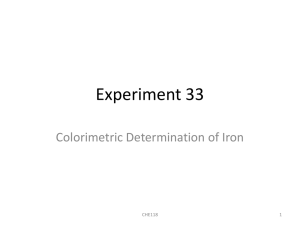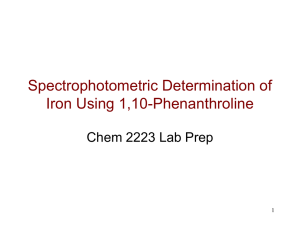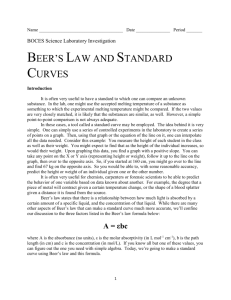Absorption spectrum and spectrophotometric determination
advertisement
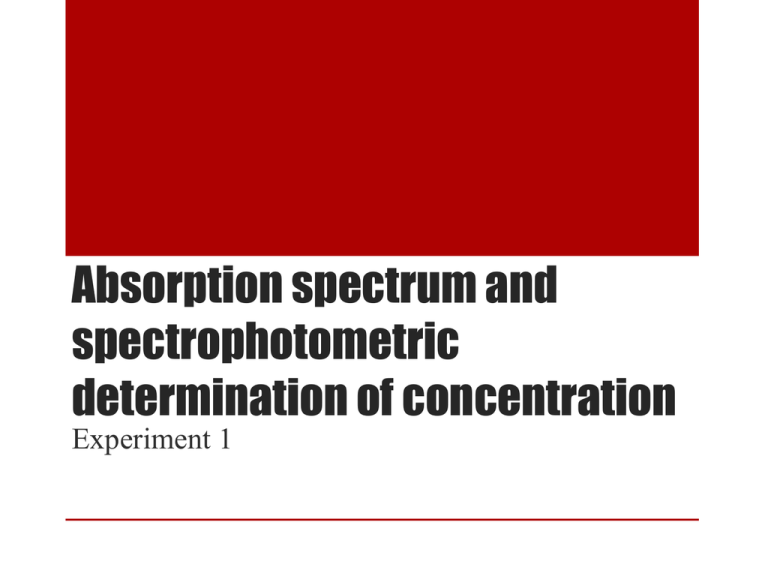
Absorption spectrum and spectrophotometric determination of concentration Experiment 1 In this lab, three things that will be discussed • Absorption spectrum • How to find the concentration of unknown sample • Extinction coefficient calculation (ε) 1-Absorption Spectrum • The curve that display the action or behaviour of absorption of molecule at different weave lengths. • Every molecule has its own Absorption spectrum, So it’s act as fingerprint for each molecule. • be shown as a plot of the light absorbed by that compound against wavelength • Uses: 1. Identification of unknown molecules 2. λmax (it is the weave length at which the molecule has the maximum absorbance) 3. Contamination detection λmax 2-Unknown Concentration of sample • The Beer-Lambert law shows linear relationship between absorbance and concentration. • So, from this they use standard curve that shows a relationship between A and concentration depending on the Beer–Lambert law • Standard curve are most commonly used to determine the concentration of a substance, using serial dilution of solutions of known concentrations(standard solutions) is a solution containing a known concentration of an element or a substance. • Once the standard curve is drawn, the concentration of an unknown sample may be determined by measuring the absorption of the sample at the same wavelength and pathlength. Concentration of unknown sample What should you do if the absorbance of the unknown sample is higher than the highest absorbance of the standard solution? Standard curve are most commonly used to determine the concentration of a substance, using serial dilution of solutions of known concentrations(standard solutions) • There are two ways to find unknown concentration: Standard curve By applying Beer-lambert law directly using available information of any standard solution to determine the “ε”, then using these information to get the unknown concentration. Using:A = εlc Note: “ε” will changed if when the weave length changed. 3-Molar extinction coefficient • The molar extinction coefficient, ε, is a measurement of how strongly a chemical species absorbs light at a given wavelength. • It is calculated from A = εlc • It is different for different substances and wave length.. • Extinction coefficient has many units but they must relate to the units of concentration and length of light path. If the concentration if in molarity E is the molar extinction coefficient(ε) (M-1 cm-1 ) Determination of Absorption Spectrum METHOD Detection the concentration of Standard curve •Take a test tube and add the following reagents: Reagent Volume (ml) 0.1 M citrate buffer, pH 2.4 9.0 7.5 x 10 - 5 M bromophenol blue 0.2 95% ethanol 0.8 1-Absorption Spectrum: • Mix and measure the absorbance of the solution from 320 to 620 nm at 20 nm intervals, using a scanning spectrophotometer, against a water blank. Remember to zero the instrument at each wavelength setting. • -Plot a graph of absorbance against wavelength (absorption spectrum curve), From the graph or spectrum determine λmax for bromophenol blue at pH 2.4 • • -λmax for bromophenol blue at pH 2.4 =……………. nm. 1-Absorption Spectrum: Tube No. 7.5x10 - 5M bromophenol blue (ml) [std.] 95% ethanol (ml) 0.1 M citrate buffer [pH 2.4] (ml) Unknown sample (ml) 1 2 3 4 5 6 7 [unknown] 0.1 0.2 0.4 0.6 0.8 1.0 - 0.9 0.8 0.6 0.4 0.2 - 9.0 9.0 9.0 9.0 9.0 9.0 9.0 1.0 2. Standard curve a) Set up 8 test tubes as follows: b) Mix and measure the absorbance of all the tubes at ………. nm against a water blank. Results: a-Record the absorbance in the table below: b-Plot a standard curve of absorbance against Molar concentration of bromophenol blue x10 – 6. c-From the curve determine the molar concentration of the unknown sample (tube 8). 2. Standard curve Tube No. Molar concentration of bromophenol blue 1 2 3 4 5 6 7[unknown] Result ................... Absorbance at 430 nm
